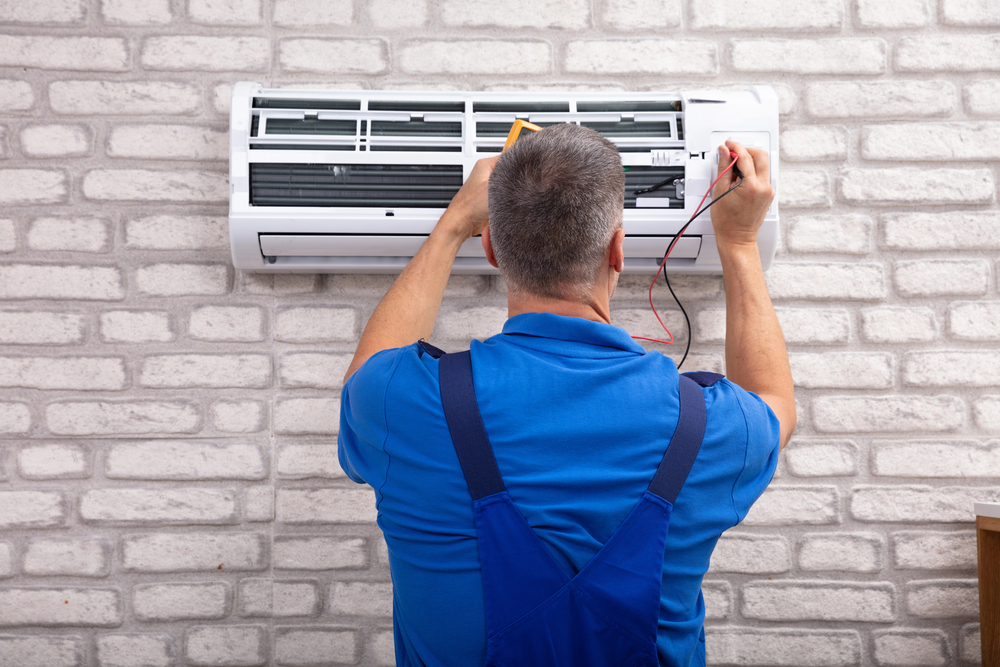

We may earn revenue from the products available on this page and participate in affiliate programs. Learn More ›
What You Need to Know
- Natural gas leaks from AC units are possible—if you suspect this could be the problem, evacuate the home immediately and call the gas company or 911.
- If the gas smell is not due to a natural gas leak, it could signal a refrigerant leak.
- Even if it’s not an emergency, a smelly air conditioning unit is usually cause for concern. It’s a good idea to have a professional diagnose the problem as soon as possible.
- Regular HVAC maintenance can reduce the likelihood of dangerous natural gas and Freon leaks.
Q: I just turned on my air conditioning for the summer and I’m worried because my AC smells like gas. I’m not sure what it could be, and I’m worried I have a gas leak. Help!
A: If you think your AC smells like gas, it’s possible you’re mistaking the smell. The smell you are noticing may come from accumulated dust or moisture, or you may have a refrigerant leak instead. But if it is actually gas, you need to get out of your home quickly and call the gas company, 911, and an HVAC professional. If the smell is not gas but instead refrigerant, it’s still a good idea to call in one of the best HVAC companies (such as Aire Serv or Dr. Energy Saver), but it won’t be necessary to evacuate. If your AC smells musty, it can indicate that there’s excess moisture where there shouldn’t be and that the unit should be serviced as soon as possible.

1. If your home smells like gas when the AC kicks on, this could indicate a natural gas leak.
Natural gas has no odor or color, so gas companies add mercaptan, a harmless but stinky chemical, to the natural gas supply to alert homeowners to a potential natural gas leak. Mercaptan, and by extension, natural gas, gives off a smell like rotten eggs that is very noticeable and unpleasant.
If you smell natural gas when you turn on your AC, “[the] gas smell could be a gas leak,” says Robert Mazzacone, owner of Mazzacone Plumbing and Heating in Ossining, New York.
“There may also be an issue with the gas supply to the heater if the system is a gas-powered HVAC unit.” If what you’re smelling is gas, or even if you suspect it is, it’s important to get people and pets out of the home as quickly as possible.

2. If you notice any signs of a gas leak, evacuate the home immediately and call the gas company and 911.
Even if the source of a gas leak isn’t the air conditioner, it’s important to evacuate the home immediately and call the gas company if you smell gas. Some additional signs of a gas leak to look for include hissing noises and air bubbles in the ground outside of the house. Long-term leaks may result in plants dying, high gas bills, or residents noticing physical symptoms such as headaches and fatigue.
Natural gas is flammable. If a gas leak comes into contact with air and a source of ignition (like a flame), it can cause a fire or even an explosion. Natural gas, when inhaled, can also cause illness and may even be fatal if inhaled in large quantities. It may be a good idea to invest in a device for testing air quality in the home, as these can alert you to natural gas or carbon monoxide levels.
3. Most AC units are not gas-powered, but they can still leak gas refrigerants like freon. Freon is often described as smelling like vinegar or chloroform.
After a natural gas leak is ruled out, the next most likely possibility is a Freon leak. If you detect an unidentifiable smell or you think your aircon smells like gas, you may be smelling refrigerant. While Mazzacone says Freon is typically odorless, he says he’s had customers report “a sweet or chemical smell.” Smelling Freon can mean a refrigerant leak, which will need to be addressed immediately. Other signs of a refrigerant leak, according to Mazzacone, include the “AC not cooling as effectively, abnormal electric bill, or ice buildup on the unit.”
Air conditioning refrigerants, often referred to by the brand name Freon, are noncombustible, so they won’t start a fire. But while the smell of Freon gas isn’t terrible, breathing in refrigerant is very dangerous and can cause refrigerant poisoning that can lead to vomiting, abdominal pain, loss of vision, difficulty breathing, and more. If you suspect a refrigerant leak, it’s advisable to call an HVAC professional immediately. Contacting an HVAC professional when you first notice a Freon gas smell can also help you avoid higher AC repair costs if the problem escalates.

4. Hissing noises or ice accumulation on the AC unit are additional signs of a refrigerant leak.
If you notice a hissing noise or ice formation on the AC unit, this may signal a refrigerant leak that needs to be attended to as quickly as possible. To determine if the AC is leaking refrigerant, place a bowl of soapy water under where the leak appears to be coming from or spray the lines with soapy water. If the water bubbles, you likely have a Freon leak. An HVAC professional can use a refrigerant leak detector to confirm the presence of refrigerant.
An HVAC inspection costs around $300 and can help identify any issues before they get too bad and the entire unit needs to be replaced. If your unit is leaking refrigerant, the HVAC company may need to recharge the air conditioner, which essentially includes adding refrigerant. AC recharge costs fall between $200 and $500.
5. Unusual AC smells could signal a deeper (and potentially dangerous) issue. It’s a good idea to contact an HVAC repair professional to get to the root of the problem.
Those wondering “Why does my ac smell?” will want to look for an answer sooner rather than later. Gas smells from an AC can be a sign that something is seriously wrong with your HVAC unit, and at worst this odor could indicate a dangerous or even deadly gas leak. To be safe, it’s essential to take precautions when dealing with any unusual AC smells. Even smells that are not gas may have alarming implications. AC units smell musty when you turn them on for the first time during the season. While this is fairly normal, if the air conditioner smells musty long after the first use, it could be a sign of black mold in the air vents. If you suspect that there is mold or mildew, you may want to run air purifiers for mold until you can get the unit serviced.
At the first whiff, whether it’s a musty smell from the AC unit or a gas smell, it’s worth scheduling an appointment with one of the best air duct cleaning services or calling an HVAC company to check it out.
6. Maintaining the AC unit and scheduling regular service can reduce the risk of future gas or refrigerant leaks.
Many issues with air conditioner smells can be avoided by keeping the unit well maintained and scheduling regular service. Regular maintenance, Mazzacone says, includes “cleaning or replacing filters, checking refrigerant levels, and inspecting parts.” Air conditioner filters can be changed at the same frequency as changing furnace filters — about every 3 months. Regular maintenance and inspections can help you catch issues early to prevent breakdowns.
HVAC service costs between $75 and $200, but if you budget it as an annual expense it can save you thousands of dollars in the long run. Delaying maintenance can lead to the need to replace the unit, and HVAC unit replacement costs an average of $7,500.
Mazzacone recommends “simple tasks, like keeping the area around the unit clean and checking for visible signs of wear” to reduce the likelihood of any issues. Watching for any signs of trouble with the AC unit and keeping up with annual maintenance will reduce the likelihood of gas or refrigerant leaks. An air conditioner that is well maintained will work safely and keep the home comfortable.
